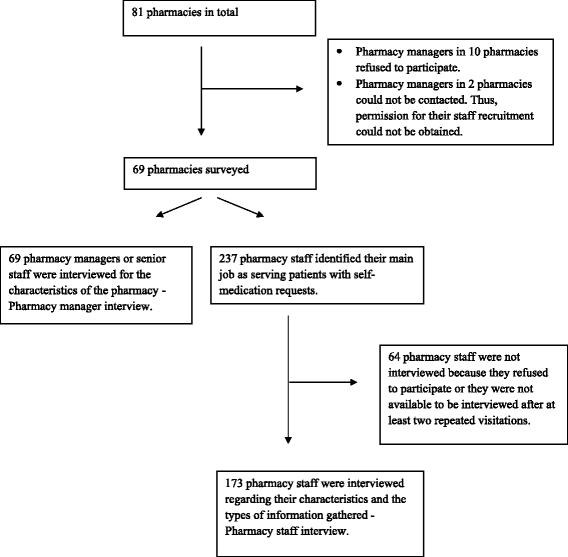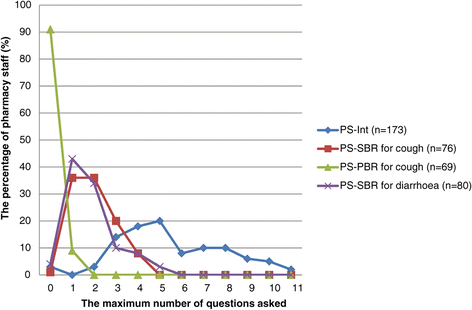Information-gathering for self-medication via Eastern Indonesian community pharmacies: a cross-sectional study
- PMID: 25608555
- PMCID: PMC4312435
- DOI: 10.1186/s12913-014-0670-6
Information-gathering for self-medication via Eastern Indonesian community pharmacies: a cross-sectional study
Abstract
Background: Gathering sufficient information when handling self-medication requests in community pharmacies is an important factor in assisting patients to obtain appropriate health outcomes. Common types of information usually gathered include patient identity, signs and symptoms, action taken, medical history, and current medications being used. The aims of the study were (1) to describe the types and amount of information gathered by Eastern Indonesian community pharmacy staff when handling self-medication requests, and (2) to identify factors associated with the reported amount of information gathered.
Methods: Patient simulation and pharmacy staff interviews were used. First, patient simulation was conducted using 2 cough scenarios and 1 diarrhoea scenario. Second, a structured interview was administered to eligible pharmacy staff in the setting. The types and amount of information gathered during patient simulation encounters and reported during pharmacy staff interviews were noted. A regression analysis was performed to identify factors associated with the amount of information gathered from the interview data.
Results: The most frequent types of information gathered in patient simulation encounters were the nature of symptoms (88% in one of the cough scenarios) and patient identity (96% in the diarrhoea scenario). Other types of information were gathered in <40% of encounters in each scenario. From the pharmacy staff interviews, >90% of the 173 interviewees reported that they gathered information on patient identity, nature of symptoms, and associated symptoms. Information on medical history and medication used was gathered by 20% and 26% respectively of the 173 interviewees. The majority of pharmacy staff asked 0 to 2 questions in the patient simulation encounters compared to 5 questions pharmacy staff reported as their usual practice during the interviews. Being qualified as a pharmacist or a pharmacy technician was one of the factors positively associated with the reported amount of information gathered.
Conclusion: There were deficits in the types of information gathered when pharmacy staff handling self-medication requests. Having a pharmacy educational background and additional work experience in the pharmacy was positively associated with the reported amount of information gathered. There could be other factors contributing to shortcomings in the actual practice which need to be explored.
Figures


References
-
- The role of the pharmacist in self care and self medication [http://apps.who.int/medicinedocs/pdf/whozip32e/whozip32e.pdf]
-
- Statement of principle self-care including self-medication: The professional role of the pharmacist [http://www.fip.org/www/uploads/database_file.php?id=204&table_id=]
Publication types
MeSH terms
Substances
LinkOut - more resources
Full Text Sources
Other Literature Sources
Medical

